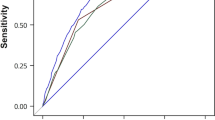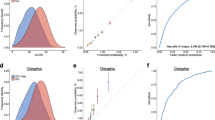Abstract
Background
Although endoscopy is commonly used for gastric cancer screening in South Korea, predictive models that integrate endoscopy results are scarce. We aimed to develop a 5-year gastric cancer risk prediction model using endoscopy results as a predictor.
Methods
We developed a predictive model using the cohort data of the Kangbuk Samsung Health Study from 2011 to 2019. Among the 260,407 participants aged ≥20 years who did not have any previous history of cancer, 435 cases of gastric cancer were observed. A Cox proportional hazard regression model was used to evaluate the predictors and calculate the 5-year risk of gastric cancer. Harrell’s C-statistics and Nam-D’Agostino χ2 test were used to measure the quality of discrimination and calibration ability, respectively.
Results
We included age, sex, smoking status, alcohol consumption, family history of cancer, and previous results for endoscopy in the risk prediction model. This model showed sufficient discrimination ability [development cohort: C-Statistics: 0.800, 95% confidence interval (CI) 0.770–0.829; validation cohort: C-Statistics: 0.799, 95% CI 0.743–0.856]. It also performed well with effective calibration (development cohort: χ2 = 13.65, P = 0.135; validation cohort: χ2 = 15.57, P = 0.056).
Conclusion
Our prediction model, including young adults, showed good discrimination and calibration. Furthermore, this model considered a fixed time interval of 5 years to predict the risk of developing gastric cancer, considering endoscopic results. Thus, it could be clinically useful, especially for adults with endoscopic results.


Similar content being viewed by others
References
Sung H, Ferlay J, Siegel RL, Laversanne M, Soerjomataram I, Jemal A, et al. Global cancer statistics 2020: GLOBOCAN estimates of incidence and mortality worldwide for 36 cancers in 185 countries. CA Cancer J Clin. 2021;71:209–49.
Akbari A, Ashtari S, Tabaiean SP, Mehrdad-Majd H, Farsi F, Shojaee S, et al. Overview of epidemiological characteristics, clinical features, and risk factors of gastric cancer in Asia-Pacific region. Asia Pac J Clin Oncol. 2022;18(6):493–505.
Rahman R, Asombang AW, Ibdah JA. Characteristics of gastric cancer in Asia. World J Gastroenterol. 2014;20:4483–90.
Kang MJ, Won Y-J, Lee JJ, Jung K-W, Kim H-J, Kong H-J, et al. Cancer statistics in Korea: incidence, mortality, survival, and prevalence in 2019. Cancer Res Treat. 2022;54:330–44.
Hori M, Okuyama A. Age-specific incidence rates of stomach cancer in the world. Jpn J Clin Oncol. 2020;50:724–5.
Machlowska J, Baj J, Sitarz M, Maciejewski R, Sitarz R. Gastric cancer: epidemiology, risk factors, classification, genomic characteristics and treatment strategies. Int J Mol Sci. 2020;21(11):4012.
Charvat H, Sasazuki S, Inoue M, Iwasaki M, Sawada N, Shimazu T, et al. Prediction of the 10-year probability of gastric cancer occurrence in the J apanese population: the JPHC study cohort II. Int J Cancer. 2016;138:320–31.
Eom BW, Joo J, Kim S, Shin A, Yang H-R, Park J, et al. Prediction model for gastric cancer incidence in Korean population. PLoS ONE. 2015;10: e0132613.
Taninaga J, Nishiyama Y, Fujibayashi K, Gunji T, Sasabe N, Iijima K, et al. Prediction of future gastric cancer risk using a machine learning algorithm and comprehensive medical check-up data: a case-control study. Sci Rep. 2019;9:12384.
Song Z, Wu Y, Yang J, Yang D, Fang X. Progress in the treatment of advanced gastric cancer. Tumour Biol. 2017;39:1010428317714626.
Fock KM. Review article: the epidemiology and prevention of gastric cancer. Aliment Pharmacol Ther. 2014;40:250–60.
Moon HH, Kang HW, Koh SJ, Kim JW, Shin CM. Clinicopathological characteristics of asymptomatic young patients with gastric cancer detected during a health checkup. Korean J Gastroenterol. 2019;74:281–90.
Schutte K, Schulz C, Middelberg-Bisping K. Impact of gastric cancer treatment on quality of life of patients. Best Pract Res Clin Gastroenterol. 2021;50–51:101727.
Van den Boorn H, Engelhardt E, Van Kleef J, Sprangers M, Van Oijen M, Abu-Hanna A, et al. Prediction models for patients with esophageal or gastric cancer: a systematic review and meta-analysis. PLoS ONE. 2018;13:e0192310.
Eom BW, Jung K-W, Won Y-J, Yang H, Kim Y-W. Trends in gastric cancer incidence according to the clinicopathological characteristics in Korea, 1999–2014. Cancer Res Treat. 2018;50:1343–50.
Park B, Yang S, Lee J, Choi IJ, Kim Y-I, Kim J. Gastric cancer risk prediction using an epidemiological risk assessment model and polygenic risk score. Cancers. 2021;13:876.
Bondy SJ, Victor JC, Diemert LM. Origin and use of the 100 cigarette criterion in tobacco surveys. Tob Control. 2009;18:317–23.
Yoo JE, Shin DW, Han K, Kim D, Jeong S-M, Koo HY, et al. Association of the frequency and quantity of alcohol consumption with gastrointestinal cancer. JAMA Netw Open. 2021;4:e2120382–e.
Choi YJ, Kim N. Gastric cancer and family history. Korean J Intern Med. 2016;31:1042–53.
Song M, Camargo MC, Weinstein SJ, Best AF, Männistö S, Albanes D, et al. Family history of cancer in first-degree relatives and risk of gastric cancer and its precursors in a Western population. Gastric Cancer. 2018;21:729–37.
Giannakis M, Chen SL, Karam SM, Engstrand L, Gordon JI. Helicobacter pylori evolution during progression from chronic atrophic gastritis to gastric cancer and its impact on gastric stem cells. Proc Natl Acad Sci USA. 2008;105:4358–63.
Correa P. The biological model of gastric carcinogenesis. IARC Sci Publ. 2004;157:301–10.
Moons KG, Kengne AP, Woodward M, Royston P, Vergouwe Y, Altman DG, et al. Risk prediction models: I. Development, internal validation, and assessing the incremental value of a new (bio) marker. Heart. 2012;98:683–90.
Song M, Kang D, Yang JJ, Choi J-Y, Sung H, Lee Y, et al. Age and sex interactions in gastric cancer incidence and mortality trends in Korea. Gastric Cancer. 2015;18:580–9.
Sullivan LM, Massaro JM, D’Agostino RB Sr. Presentation of multivariate data for clinical use: The Framingham Study risk score functions. Stat Med. 2004;23:1631–60.
Steyerberg EW, Harrell FE Jr, Borsboom GJ, Eijkemans MJ, Vergouwe Y, Habbema JD. Internal validation of predictive models: efficiency of some procedures for logistic regression analysis. J Clin Epidemiol. 2001;54:774–81.
de Vries AC, van Grieken NC, Looman CW, Casparie MK, de Vries E, Meijer GA, et al. Gastric cancer risk in patients with premalignant gastric lesions: a nationwide cohort study in the Netherlands. Gastroenterology. 2008;134:945–52.
Yusefi AR, Bagheri Lankarani K, Bastani P, Radinmanesh M, Kavosi Z. Risk factors for gastric cancer: a systematic review. Asian Pac J Cancer Prev. 2018;19:591–603.
Lou L, Wang L, Zhang Y, Chen G, Lin L, Jin X, et al. Sex difference in incidence of gastric cancer: an international comparative study based on the Global Burden of Disease Study 2017. BMJ Open. 2020;10:e033323.
Trédaniel J, Boffetta P, Buiatti E, Saracci R, Hirsch A. Tobacco smoking and gastric cancer: review and meta-analysis. Int J Cancer. 1997;72:565–73.
Tatsuta M, Iishi H, Nakaizumi A, Okuda S, Taniguchi H, Hiyama T, et al. Fundal atrophic gastritis as a risk factor for gastric cancer. Int J Cancer. 1993;53:70–4.
Leung W, Sung J. Intestinal metaplasia and gastric carcinogenesis. Aliment Pharmacol Ther. 2002;16:1209–16.
Park YH, Kim N. Review of atrophic gastritis and intestinal metaplasia as a premalignant lesion of gastric cancer. J Cancer Prev. 2015;20:25.
Calam J, Gibbons A, Healey ZV, Bliss P, Arebi N. How does Helicobacter pylori cause mucosal damage? Its effect on acid and gastrin physiology. Gastroenterology. 1997;113:S43–9; discussion S50.
Ernst PB, Crowe SE, Reyes VE. How does Helicobacter pylori cause mucosal damage? The inflammatory response. Gastroenterology. 1997;113:S35–42; discussion S50.
Smoot DT. How does Helicobacter pylori cause mucosal damage? Direct mechanisms. Gastroenterology. 1997;113:S31–4; discussion S50.
Kim SG, Jung HK, Lee HL, Jang JY, Lee H, Kim CG, et al. Guidelines for the diagnosis and treatment of Helicobacter pylori infection in Korea, 2013 revised edition. J Gastroenterol Hepatol. 2014;29:1371–86.
Funding
This work was supported by the Medical Research Funds from Kangbuk Samsung Hospital (Grant No. I20016, 2021). The funding sources had no role in the design and conduct of the study; collection, management, analysis, and interpretation of the data; preparation, review, or approval of the manuscript; or the decision to submit the manuscript for publication.
Author information
Authors and Affiliations
Contributions
HO: conceptualization, writing—original draft; SC: writing—original draft, formal analysis; JAL: conceptualization, writing—review and editing, supervision, funding acquisition; SR writing—review and editing, supervision; YC conceptualization, writing—review and editing, supervision.
Corresponding author
Ethics declarations
Conflicts of interest
The authors have no conflicts of interest to disclose.
Ethical approval
This study complied with the Declaration of Helsinki and was approved by the Institutional Review Board of Kangbuk Samsung Hospital, which waived the requirement for informed consent because of the use of anonymized data routinely collected as part of a health checkup program linked to mortality data from the Korea National Statistical Office (IRB No. 2011-01-030-005 for the general Kangbuk Samsung Health Study protocol and 2021-08-046 for the present study).
Additional information
Publisher's Note
Springer Nature remains neutral with regard to jurisdictional claims in published maps and institutional affiliations.
Supplementary Information
Below is the link to the electronic supplementary material.
Rights and permissions
Springer Nature or its licensor (e.g. a society or other partner) holds exclusive rights to this article under a publishing agreement with the author(s) or other rightsholder(s); author self-archiving of the accepted manuscript version of this article is solely governed by the terms of such publishing agreement and applicable law.
About this article
Cite this article
Oh, H., Cho, S., Lee, J.A. et al. Risk prediction model for gastric cancer within 5 years in healthy Korean adults. Gastric Cancer (2024). https://doi.org/10.1007/s10120-024-01488-4
Received:
Accepted:
Published:
DOI: https://doi.org/10.1007/s10120-024-01488-4




